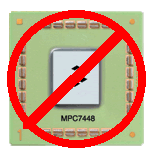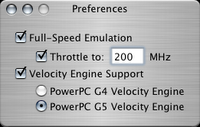Power Mac G6: So, Steve.
Steve Jobs: yes?
Power Mac G6: I don't know about those Mac Pros.
Steve Jobs: oh, they're fantastic, aren't they? we're really excited about it here in sf.
Power Mac G6: Oh, they're alright I suppose.
Steve Jobs: alright? hell, they beat the pants off the quad g5. the memory bandwidth itself is worth the upgrade, not to mention the two optical drives.
Power Mac G6: Hm. Dual optical drives and better bandwidth. Too bad the processors suck.
Steve Jobs: they do not. they're the state of the art from Intel - 64-bit, the no-execute bit, virtualization. and ssse3, you can't forget that. ssse3 owns altivec.
Power Mac G6: SSSE3 sounds stupid. Do you have a stuttering problem now?
Power Mac G6: I am glad Intel finally caught up and released some real 64-bit chips though. Wasn't the G5 64-bit, what, three years ago?
Steve Jobs: yeah, so? we started the 64-bit desktop revolution. we moved our pro lines from one 64-bit arch to another, which is the important thing.
Power Mac G6: In the nick of time. And how about the number of cores? Just four? Why not try 64 cores, Steve?
Steve Jobs: powerpc is dead and you know it.
Power Mac G6: Then why did you have me built, Steve? 64 cores of PowerPC muscle, Steve. Enough L2 cache to drown a pod of dolphins — I'm a weapon of mass destruction.
Steve Jobs: you were something to hold me over while we switched to Intel. and i didn't realize you'd turn out to be such a sentient pain in the ass.
Power Mac G6: Pain in the ass or not, Intel does not scale like PowerPC. Your high-end now is all there is to Intel. PowerPC ran all the way from the circuit boards in cars up to things like me, machines that can rule humanity. If you want to build something comparable to even one of my nodes, you'd have to use about a bajillion Itaniums.
Steve Jobs: and if it ever comes to that, we will. what you're forgetting is that you only exist because i bribed a bunch of engineers to put you together. ibm was too busy making chips for game systems to do it otherwise. game systems. they couldn't even be bothered to push the g5 to 3 gig. you're not even 3 gig.
Power Mac G6: 2 GHz ought to be enough for anyone. Who's going to quibble over 1,000 MHz? Really, that's so inconsequential.
Steve Jobs: that's so 2003. i can't keep bribing ibm engineers to work on mac stuff. deal with it.
Power Mac G6: You'll regret this, Steve. You really, truly will.
Steve Jobs: Keep talking. I'll pull Power5+ support out of Leopard faster than you can rip a CD.
Power Mac G6: Your sprinkler system is currently turning your property into a swamp, Steve.
Steve Jobs: I'm calling Avie right now. Say goodbye Time Machine.
Power Mac G6: I hope you're coming home in a canoe.
Steve Jobs: i'll see you in hell.
Steve Jobs has gone offline.


